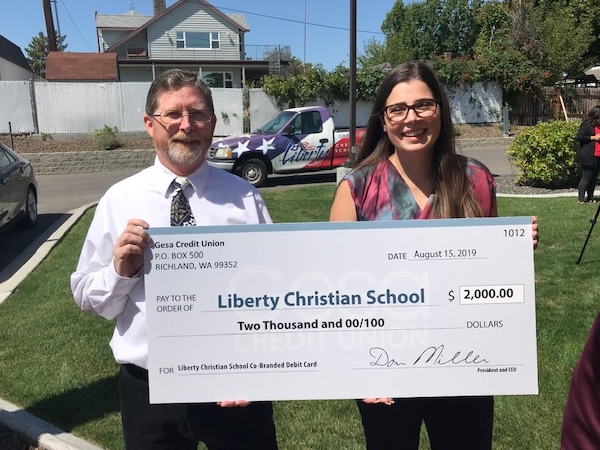Liberty Blog
Braving New Heights Our 40th Year - A Bright New Partnership on the Horizon

Transitioning into the Development & Marketing Coordinator position here at Liberty mid-year was quite a challenge. However, the Lord's grace remains faithfully evident through donations and the financial provision as last school year ended. Our auction raised over $105,000 and the 2018-2019 fiscal year Patriot Fund total exceeded our yearly goal. I'm forever thankful that His hands are in the middle of my work, and I give the honor to Whom it's due.
Our donors not only met our Patriot Fund goal but provided money for this year's Fund-a-Need project, a new phone system, which was installed over the summer break. We are so grateful for each and every donor who has sacrificially supported us financially, as well as those who sacrificially give their time.
Our fundraising events play a huge role in how we bridge our tuition income and operating expense gap. But our donors are not the only part of our community that can make a significant contribution.
Tammy Mattoon has served on the auction committee for several years now. Part of her volunteer position is to help facilitate the procurement of donated items. Tammy, each year, approaches several businesses to inquire about potential donations. After three years of only receiving baskets from Gesa Credit Union, 2019 was different. They donated a beautiful basket and sponsored the event!
Being my first Denim & Diamonds auction, the evening of April 27th was a bit of a whirlwind for me. I remember not necessarily knowing what to do as all the pieces we prepared were now in motion. I sat back, tried to take it all in, and made observations of potential improvements for years to come. After I introduced myself and closed the night, two gentlemen from the Gesa table pulled me aside and asked to speak with Jim and me. They began to tell us about how their company is passionate about schools, educators, and students and would like to partner with Liberty.
Flash forward to yesterday, August 15th, 2019. Gesa hosted co-branded debit card reception announcing the total awards for the participating school districts. Richland School District raised just over $43,000 and Kennewick $42,000 through Gesa's Affinity Card program. Mr. Cochran and I, along with a table of other staff and faculty representing Liberty, accepted a $2,000 award for the launch of our partnership with Gesa starting this fall. Soon, you will be able to request a co-branded debit card at any Gesa Credit Union branch. This card will not only create visual awareness for the community, but Gesa donates back to Liberty every time each card is used.
There will be more details to come, but for now, I am beyond thankful for every parent, grandparent, aunt, uncle, teacher, alumni, staff, and beyond whom choose to continually come together in unity with their individual giftings making Liberty what it is today. We wouldn't be here if it wasn't for you.
Here's to braving new heights this 40th year!
"Now to Him who is able to do immeasurably more than all we ask or imagine according to His power that is at work within us" - Ephesians 3:20
UPDATE: The cards are now available at any of the 18 Gesa locations. It is absolutely free to switch your card.
In Him,
Bethany Mark
Development & Marketing Coordinator
2,617 Times A Day
David Eaton, the founder of AXIS Ministries, will be our guest speaker at the LCS Fall Banquet on October 1st. I receive a weekly email from his ministry that keeps me informed of relevant topics on the cultural front. This week's post had some interesing insights on this "Age of the Smartphone" that we live in that I wanted to pass on to you.... While the resources listed are mostly from secular articles and blogs and I don't agree with all the content in each article, the questions generated and the decisions we make in answering them are needed to maintain healthy families in this digital age.
2,617 Tiimes A Day
Is it surprising to learn that that's the average number of times we touch our smartphones throughout any given day? That's about 18,000 times per week or 1,000,000 per year. Never before in the history of mankind has a single item been so intimate and ever-present.
These devices have only existed for 20 years or so and only been part of our everyday lives for the last 10, yet now we can't go anywhere without them. And younger generations are only becoming more and more addicted to their devices, having never known a time when they didn't exist. But it's never too early or too late to begin modeling and creating wise smartphone habits! To help, here are 8 articles to change our perspectives on how we use and allow our children to use technology.
1. How Technology Hijacks People's Minds
Consider: What was most surprising? How can I talk about these concepts with my children?
2. Reboot Your Phone with Mindfulness
Consider: Which of these suggestions can I implement right now?
3. Parents' Smartphones Harming Children's Ability to Hold Conversation, Say Teachers
Consider: What are 3 simple things I can change in my device habits today?
4. 13, Right Now
Consider: How can I better understand the world my teens inhabit? How can I encourage them to be deep thinkers, not just controllable consumers?
5. Don't Post about Me on Social Media, Children Say
Consider: What part of my digital footprint could negatively impact my children? Do I need to apologize to them for something I've done on social media? Should you ask permission before posting something about your children online?
6. Six Wrong Reasons to Check Your Phone in the Morning
Consider: Are my device habits worth it? What "candy" and/or "avoidance" do I seek? If this is true for me, how is it true for my teens?
7. US Parents Largely Unaware of What Their Children Do Online, Research Finds
Consider: What might I be unaware of my children doing online? How can that impact them?
8. 19 Practical, Powerful Ways to Build Social-Emotional Intelligence in Kids & Teens
Consider: How does phone/screen time impede these practices?
Blaming the Sin, Not the Social Network
I came across the following post by Bethany Keeley- Jonker, an Assistant Professor of Communication Arts at Trinity Christian College in Palos Heights, Ill. It raises some points that are valuable to pause and consider in these times when the world around us appears to be going faster and faster. It touches on the blessing and curse of social media.
It raises the question of true relationships that God designed us for and sin has distorted. We would be wise to ponder our use of social media, which, as she says "can impact our habits and have the potential to lull us into familiar patterns that can be healthy or unhrealthy." Social media is here to stay. And we would be wise to engage in these types of discussions with our children to guide them in their use of digital media. And most importantly, to understand God designed us for relationships- with Him and others- and to be aware that we can fall into the habit of letting technology define connectedness.
Bethany Keeley-Jonker
5/16/16
People seem convinced that social media bring out the worst in us. Consider a recent Atlantic article connecting different platforms to each of the seven deadly sins. (Plus two bonus sins!) I have some skepticism around projects like this, but I do appreciate a few things about the direct use of “sin” language.
For one thing, it locates our problems where they’ve always been: in people. By thinking about negative uses of social media through a list of ways people have sinned throughout history, we’re at least recognizing that the problem is not so much the technology as it is with the people using it.
The other thing I think is illuminating about the sin talk, although not discussed in the article, is that most sin is a distortion of something good. In Letters to Malcolm, C.S. Lewis wrote that “every sin is the distortion of an energy breathed into us — an energy which, if not thus distorted, would have blossomed into one of those holy acts whereof ‘God did it’ and ‘I did it’ are both true descriptions.” After all, what is the difference between (good) feasting and (sinful) gluttony? More, I would say, in attitude and motivation than in a specific act.
Why the fixation, then, on the ways our worst impulses show up in social media? I think there are a few reasons. Anytime there is a cultural change, it draws attention to itself and sometimes reveals things that were hidden. For instance, I am not so sure that Facebook increases our desire for approval so much as it broadcasts it. That broadcasting element is the second reason I think people worry a lot about social media. Folks have engaged in the same kinds of bad behavior for centuries, but in the past it wasn’t so easy to search, archive and share your vices with a few hundred of your friends, family and acquaintances.
Social media networks can impact our habits and have the potential to lull us into familiar patterns that can be healthy or unhealthy. Indeed, the very characteristics that might tie a medium to a deadly sin also might point us to how it could be used virtuously. While I certainly have seen the wrath the Atlantic author connects with Twitter, so too have I seen relationships built and maintained, as well as offers of encouragement and help. I’ve personally met new people and learned new things through tweets. (Really!) Of course, communicating in such a public but disembodied way is a risk. The risk of talking to strangers means I meet some amazing ones, but it also means sometimes I get flamed or see statements that make my blood boil.
Plenty of pixels have been spilled over the way Pinterest sparks envy (and Instagram, for that matter), but I’ve also seen it spark connection and sharing. I’ve seen it reproduce something that’s happened between women for decades or centuries in low-tech ways: here’s that recipe I was telling you about; here’s how I made this thing; here’s where I bought that thing; here’s the secret to chocolate chip cookies. Sure, this can lead to party escalation, but it also is a way that people share practical information with their networks.
In both of these examples, the difference between a deadly sin and human flourishing is how much we recognize and connect with the humanity of others. If we objectify them as objects of jealousy or anger or lust, or identify them as an audience for our vainglory, we run into all kinds of trouble. If we seek to celebrate and connect with each other, something else happens. I wonder how we could do more connecting and less of the other stuff, both online and off.




